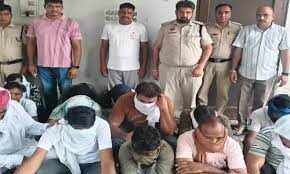Rajasthan News: Rajasthan High Court, while giving its verdict in a case under the S-ST Act, said that words like ‘Bhangi’, ‘Neech’, ‘Bhikhari’, ‘Mangani’ are not the names of castes and their use is prohibited under the SC/ST Act 1989. Allegations cannot be made under this. Justice Birendra Kumar of Rajasthan High Court made this comment while dismissing the charges against the four petitioners under the SC/ST Act. The petitioners are accused of using such words against some public servants who had come to inspect and remove some encroachments. The Court observed that there was neither any caste reference in the words used nor anything to indicate that the petitioners intended to insult a public servant on the basis of his caste.
What did the court say?
The court said that – “The words used were not names of castes nor is it an allegation that the petitioners were aware of the caste of the government employees who had gone to remove the encroachment. Moreover, from a perusal of the allegations it is clear that the petitioners, the government employees There was no intention to cause humiliation by reason of the fact that they were members of the Scheduled Castes and Scheduled Tribes, but the action of the petitioners was to protest against the measurement action being taken unfairly by the Government servants.”
What is the matter?
The case pertains to an incident in January 2011, when some officials had gone to an area in Jaisalmer to inspect alleged encroachment on public land. During the inspection, the petitioners allegedly prevented the officers from working and abused them with derogatory words.
This led to FIR against the petitioners under IPC sections 353 (assault or criminal force to deter public servant from discharge of his duty), 332 (causing hurt to deter public servant) and 34 (common intention) and SC/ST A criminal case was registered under Section 3(1)(x) of the Act.
Although the police initially found the allegations baseless and submitted a negative report, a protest petition eventually led to the trial court being approached to frame criminal charges against the petitioners. Following this, the accused petitioners moved the High Court seeking quashing of the case against them. Counsel for the petitioners argued that the allegations lack evidence to warrant a charge under Section 3(1)(x) of the SC/ST Act, which provides for intentional insult with intent to insult any SC/ST member in a public place. Of or relating to threatening. The petitioners said they were not aware of the caste of the informant, and there were no independent witnesses present to confirm that the incident had occurred in public.
The Court found merit in these arguments, including that there were no independent witnesses to support the claim that the alleged incident took place in public.
In the order dated November 12, the court said – “In this case, only the informant and his officers are witnesses to the incident, no independent witness has come forward to support that he was a witness to the incident.”
Accordingly, the Court partially allowed the petition and discharged the petitioners from the SC/ST Act case. However, the Court upheld the remaining charges under sections 353 and 332 of the IPC, noting that there were sufficient grounds to prosecute on these charges. “The prima facie allegation is that the petitioners obstructed the official discharge of public duty by the respondent and hence the petitioners will be liable to criminal prosecution for that act,” the Court said.










